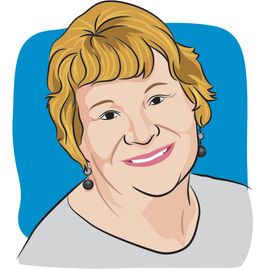- About Us
- Advertise / Support
- Editorial Board
- Contact Us
- CancerNetwork.com
- TargetedOnc.com
- OncLive.com
- OncNursingNews.com
- Terms & Conditions
- Privacy
- Do Not Sell My Information
- Washington My Health My Data
© 2025 MJH Life Sciences™ and CURE - Oncology & Cancer News for Patients & Caregivers. All rights reserved.
Cancer Survivors Can Get Tired of Being Called ‘Strong’

Jane Biehl is a 12-year survivor of a very rare form of blood cancer, known as myelodysplastic syndrome (MDS). She has enjoyed several exciting careers including a librarian, counselor, teacher, and writer. She loves to write about surviving cancer, overcoming hearing loss and the wonderful benefits of having a hearing-ear service dog.
I must admit when people call us cancer survivors "strong," it's a double-edged sword.
Recently I was talking with a friend and asked her how her sister was doing. Her sister and I have had a friendship of over 40 years, worked together and have shared many experiences. Currently, her sibling is experiencing excruciating pain from arthritis and surgeries and was given a recent diagnosis of COPD. Through all of this, she has remained patient and positive and is constantly helping out her family. However, I could see the effort every single step took in the way she moved.
I remarked on what a rough time she was having, and her sister replied, “But she is strong.” I froze, nodded and walked away. I resented that remark a little bit, but I knew it was meant to be a compliment and how much the sister respected my friend. However, because of my own experience with cancer, I felt like this was a double-edged sword. People often comment to me that with my myelodysplastic syndromes, profound hearing loss and numerous other health problems, I am strong and resilient. I think to myself: “Do I have a choice?”
I somehow feel that this puts an added burden and pressure on someone we call strong. We may appear calm and poised on the outside but inside, we may feel like a hot mess. Our stomachs are churning, we are frightened about our future, we feel sick and rotten, and we are physically and mentally whipped. Some days we are human.
I have days when I want to scream, throw things, stamp my feet, cry and go into the fetal position asking, “Why me?” Is there any human on earth who hasn’t cried out after a misfortune? Not because we want others to suffer misfortune, but because no one should have to go through such pain and fear.
I have personally discovered when I mention a problem like my overwhelming dental bills, for example, someone will respond, “Well my child has braces.” This is after I explained I have lost over a dozen teeth from this insidious disease. It is not the same. But then I never say anything, again.
These situations are where the help of other cancer survivors can be so important. We are permitted to melt down, and admit we are tired of treatments, doctors, blood draws, fear about the future and mounting medical bills.
Indeed, it is a compliment to be called strong, but it is also helpful for the person giving the compliment to say, “I know it is so hard, and admire you, but how do you really feel?” We all have two personas: public and private. Please do not expect us to only show you our public persona. It is a blessing to have permission to cry, scream and complain. Eventually, most of us go back to being positive again because that is how we have survived. In the meantime, please allow us to be human!
For more news on cancer updates, research and education, don’t forget to subscribe to CURE®’s newsletters here.
Related Content:


